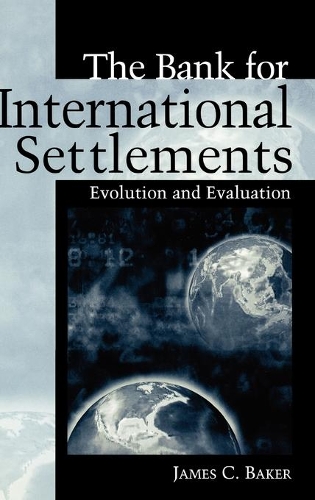
The Bank for International Settlements: Evolution and Evaluation
(Hardback)
Publishing Details
The Bank for International Settlements: Evolution and Evaluation
By (Author) James C. Baker
Bloomsbury Publishing PLC
Praeger Publishers Inc
30th March 2002
United States
Classifications
Tertiary Education
Non Fiction
Banking
Economic history
332.155
Physical Properties
Hardback
280
Width 156mm, Height 235mm
567g
Description
A readable, engrossing examination of the oldest existing international financial institution and a balanced evaluation of its value, importance, and the good it has done weighed against the bad. In a world of increasing cross-border financial transactions, The Bank for International Settlements stands out as the oldest existing international financial institution and among the most controversial. For many it is a mystery: What does it actually do For others it poses an ethical dilemma: What DID it do to aid the Nazis during World War II Baker examines the history, administration, evolution, and operations of this reclusive institution. He discusses the work of its permanent committees, such as the Basle Concordats of 1975 and 1983 and the Basle Capital Accords of 1988 and 2001. Among other products and services he notes The BIS's studies of the use of derivatives by banks, its analysis of payment and settlement systems worldwide, and its supervision of the insurance and investment banking businesses. Then, in a cool and balanced appraisal, he looks at the Bank's operations during World War II, its relationship with the Nazis in their gold and foreign exchange transactions. Throughout, he underlines the importance of The BIS and its value in maintaining stability of the international monetary system. The result is a major academic study, a work of special interest to scholars, teachers, and students, and an important, readable, engrossing account for finance and investment professionals as well.
Reviews
"Few international financial institutions are less understood and appreciated by the international community than is the Bank for International Settlements (BIS). The author offers a comprehensive look at BIS and the critical role it plays in the global monetary system. Further, the book specifically addresses all of the concerns that have been directed toward the bank over the years; often criticisms that resulted from a misunderstanding of the Bank's purposes. For example, Baker considers such 'sticky issues' as the Bank's key position to provide leadership in stemming the flow of 'laundered money' and the question of the 'secrecy' of the institution. I strongly recommend the book to all members of the international banking and finance community."-John K. Ryans, Jr., Bridgestone Professor of International Business Kent State University
"The world of finance is becoming increasingly volatile and global, with financial events in one country having significant impacts on other countries. As the bank for the world's central bankers and as the coordinator among the world's financial regulators, the Bank for International Settlements (BIS) is a very important global financial institution. Indeed, the BIS has and will continue to play an important role limiting the vulnerability of the global financial system. This new book by James C. Baker on the BIS is a significant addition to our understanding of this very important institution."-Raj Aggarwal, Firestone Chair of Finance Kent State University
Readers will come away from this book with an appreciation of the role of an obscure and enduring international financial institution and its significance in world affairs. Baker (finance and international business, Kent State Univ.) traces the evolution of the Bank for International Settlements (BIS) as it refashioned itself in response to changing world conditions. Initially established in 1930 in Basle, Switzerland, by European central banks and three major US commercial banks, the BIS was designed primarily to facilitate German war reparations payments and secondarily to facilitate transactions among central banks. With cessation of reparations in 1932, the ever-adaptable BIS began to emphasize its secondary function. Baker then describes how the BIS expanded its role in response to changing needs of the international financial community by providing an excellent source of international statistics, developing international standards for bank regulation and supervision, serving as a forum for communication among central bankers, establishing worldwide standards for insurance, and expanding its sphere of operations from a regional to global network. An evaluation and look to future roles for the BIS concludes the volume. Recommended for upper-division undergraduate through professional collections.-CHOICE
"Readers will come away from this book with an appreciation of the role of an obscure and enduring international financial institution and its significance in world affairs. Baker (finance and international business, Kent State Univ.) traces the evolution of the Bank for International Settlements (BIS) as it refashioned itself in response to changing world conditions. Initially established in 1930 in Basle, Switzerland, by European central banks and three major US commercial banks, the BIS was designed primarily to facilitate German war reparations payments and secondarily to facilitate transactions among central banks. With cessation of reparations in 1932, the ever-adaptable BIS began to emphasize its secondary function. Baker then describes how the BIS expanded its role in response to changing needs of the international financial community by providing an excellent source of international statistics, developing international standards for bank regulation and supervision, serving as a forum for communication among central bankers, establishing worldwide standards for insurance, and expanding its sphere of operations from a regional to global network. An evaluation and look to future roles for the BIS concludes the volume. Recommended for upper-division undergraduate through professional collections."-CHOICE
Author Bio
JAMES C. BAKER is Professor of Finance and International Business at Kent State University. A fellow of the Association for Global Business, Baker has published widely on a variety of topics in international finance and business, and his articles appear frequently in such publications as the Journal of World Trade, International Journal of Finance, and Journal of International Arbitration. Among his more recent books is one published in 1999 by Quorum, Foreign Direct Investment in Less Developed Countries: The Role of ICSID and MIGA.
